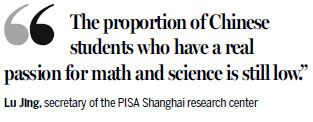Expert: Low test scores not a worry
People should not overreact to the fall in ranking of Chinese students in the 2015 Program for International Student Assessment; they should focus on what the test results indicate about the education system in China, experts said.
Chinese students' scores fell across the board in science, reading and mathematics in the 2015 PISA compared with 2012, although they were able to retain their top-10 ranking in science and math, according to an assessment of results released on Tuesday by the Organization for Economic Cooperation and Development.
The 2015 PISA was taken by about 540,000 students aged 15 in 72 countries and economies on science, math and collaborative problem-solving. In China, students in Beijing, Jiangsu, Guangdong and Shanghai took the two-hour test.

Shanghai began participating in the PISA in 2009 and was the only city on the Chinese mainland partaking in the test. In both the 2009 and 2012 tests, Shanghai surpassed all other participating countries and regions.
However, in the 2015 test, Singapore dominated across all three subjects, ranking first and outperforming the rest of the world. Students in Beijing, Jiangsu, Guangdong and Shanghai scored a median 518 and were ranked 10th in science, compared with the 580 that students from Shanghai alone scored in 2012.
For mathematics, students in China scored 531 and were ranked sixth, compared with 613 in 2012. Their score in reading was 494, a more obvious decline compared with 2012.
Yong Zhao, a professor at the University of Kansas' school of education, said that there is no reason to overreact to China's scores, because he doesn't believe the PISA "measures the totality of the quality of education of any education system".
He said that adding more provinces to the test might have caused the dip, but that there could have been other contributing factors.
"Overall, we don't need to read too much into PISA or other international tests," he wrote in an email response to questions.
Lu Jing, a researcher at the Shanghai Academy of Educational Sciences, agreed. She said the change in participating cities and provinces had a big impact on the test results, adding that as students from Shanghai represented the highest level and best performance, it's normal that the average test scores fell after more cities and provinces were involved in the test.
Lu, who is also secretary of the PISA Shanghai research center, added that she is more interested in what the scores and rankings reflect about China's education system.
"Big gaps now exist among students from different provinces and regions, while the proportion of Chinese students who have a real passion for math and science is still low," she said. "Solving these problems is more important and meaningful to Chinese educators than just looking at the scores."


















